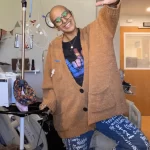Stroke Misdiagnosed as Anxiety Leads to Vision Loss in Young Woman
In a world where every day feels like a rush against time, we often overlook the delicate balance between our physical health and mental well-being. It’s not until a sudden health crisis hits us or someone close that we pause to reconsider our priorities and the fragility of our existence. This article aims to shed light on such an experience, one that resonates with the unpredictable challenges life throws at us.
Chandler Plante’s story is not just a narrative about confronting health adversities; it’s a testament to human resilience and the power of a positive outlook. A young, vibrant woman’s journey from battling COVID-19 to facing unexpected, life-altering medical challenges is both harrowing and inspiring. It compels us to reflect on the importance of being proactive about our health, understanding the complexities of medical diagnoses, and above all, the significance of nurturing our mental and spiritual well-being amidst physical trials.
As we delve into Chandler’s story, let’s remind ourselves that this is more than just a recount of events. It’s a narrative intertwined with lessons on wellness, the pitfalls of medical misdiagnoses, and the strength found in positivity and community support. So, as you read on, prepare to be informed, moved, and inspired, for this is a journey that speaks to the fighter in each of us.
Chandler Plante’s Journey
Chandler Plante’s life, like that of many young adults, was a vibrant mix of career ambitions and personal aspirations. As an assistant editor at POPSUGAR and former staffer at PEOPLE, she navigated her early 20s with a zest that resonated with many. However, December 2020 marked a turning point that no one, least of all Chandler, could have anticipated. After contracting the original strain of COVID-19, Chandler’s health took a perplexing turn. What started as a battle with a virus soon spiraled into a series of baffling symptoms.
Severe migraines, numbness in her hands and forearms, and a concerning episode of left arm numbness and tongue paralysis – these symptoms were alarming yet mystifying. Tragically, these were initially dismissed as mere manifestations of anxiety, a common misstep in the complex world of medical diagnoses.
The reality, however, was far more grave. In March, Chandler experienced what was her first ischemic stroke, misdiagnosed as an anxiety attack. This misdiagnosis was not just an oversight; it was a missed opportunity to prevent further complications. The next stroke in June revealed critically stenosed internal carotid arteries, a condition startling for someone her age. The journey didn’t end there. In November 2021, a large mass behind her eyeball was discovered.
Initially thought to be a meningioma, a type of brain tumor, it later turned out to be something else, leaving Chandler and her family in a state of uncertainty and fear. This fear materialized when she lost vision in her right eye, a terrifying experience compounded by the chaos of the COVID-19 pandemic overwhelming hospitals.
Chandler’s story is not just a series of medical events. It’s a narrative of courage and endurance. Despite the odds, her spirit remained unbroken. Her resilience in the face of misdiagnosis, vision loss, and the physical and emotional toll of her condition is nothing short of inspiring. It’s a powerful reminder of the unpredictability of health and the importance of advocacy in medical care.
The Intersection of Physical Health and Mental Well-being
Chandler Plante’s ordeal underscores a crucial aspect of health that often goes unnoticed: the intricate interplay between physical health and mental well-being. Her journey illuminates how physical ailments can be misconstrued as psychological issues and vice versa, revealing a gap in our understanding and approach to holistic health. Chandler’s initial symptoms, which were physical in nature, were hastily attributed to anxiety, a common mental health condition.
This misdiagnosis not only delayed the correct treatment for her physical ailments but also highlighted a prevalent issue in healthcare: the tendency to oversimplify symptoms without considering the complete picture of an individual’s health.
This oversight brings to light the importance of holistic health – an approach that considers the entire spectrum of physical, mental, emotional, and spiritual well-being. It emphasizes that our health is not just the absence of disease or infirmity but a state of complete harmony of the body, mind, and spirit. In Chandler’s case, her physical health challenges inevitably impacted her mental state.
The stress of coping with a misdiagnosis, the anxiety of losing vision, and the emotional turmoil of a life upended by health issues are profound. They serve as stark reminders of how physical health crises can lead to significant mental health struggles.
Moreover, Chandler’s experience compels us to advocate for a healthcare system that recognizes and addresses the interconnectedness of physical and mental health. It calls for a more empathetic, thorough approach to diagnosis and treatment, where mental health is given as much importance as physical health.
Challenges in Healthcare: The Issue of Misdiagnosis
Chandler Plante’s journey brings to light a critical challenge in the healthcare system: the issue of misdiagnosis. Her experience is a poignant example of how misinterpreting symptoms can lead to severe consequences and highlights the need for a more accurate and comprehensive approach in medical diagnostics. Misdiagnosis is not a rare occurrence. It can happen due to various reasons, such as a lack of comprehensive patient history, time constraints in clinical settings, or even biases that can cloud clinical judgment.
In Chandler’s case, the dismissal of her severe symptoms as anxiety rather than a stroke is a clear indication of how easily significant health issues can be overlooked. The implications of misdiagnosis are far-reaching. For Chandler, it meant delayed treatment, additional health complications, and a profound impact on her quality of life. It’s a sobering reminder that getting a diagnosis right is not just a matter of medical accuracy, but also of a patient’s future well-being. This issue also underscores the importance of patient advocacy.
Chandler’s story teaches us the value of seeking a second opinion, asking detailed questions about our health, and persistently advocating for comprehensive medical examinations. It’s a call to be proactive about our health, to research, and to be unafraid of questioning medical assessments when they don’t align with our symptoms. Furthermore, Chandler’s experience sheds light on the need for a healthcare system that is more attuned to the complexities of each patient’s situation. A system where doctors have the time and resources to delve deeper into a patient’s symptoms and where a multidisciplinary approach is the norm rather than the exception.
Comprehensive List of Tips for Navigating Health Challenges
Navigating health challenges can be daunting, especially when facing situations like misdiagnoses or complex medical conditions. Here is a comprehensive list of tips to help individuals advocate for their health and well-being effectively:
Keep Detailed Medical Records: Maintain a record of your medical history, symptoms, treatments, and any medications you’re taking. This information can be invaluable during medical consultations.
Research Your Symptoms: Educate yourself about possible conditions related to your symptoms. However, avoid self-diagnosing and use this information to have informed discussions with your healthcare provider.
Seek Second Opinions: If you’re uncertain about a diagnosis or treatment plan, don’t hesitate to seek a second opinion. It can provide a different perspective or confirm the initial diagnosis.
Communicate Clearly with Your Healthcare Provider: Be open and honest about your symptoms and concerns. Clear communication can lead to a more accurate diagnosis.
Ask Questions: Don’t shy away from asking your doctor questions about your diagnosis, treatment options, and what to expect. Understanding your health situation is crucial for making informed decisions.
Listen to Your Body: Trust your instincts about your health. If something feels wrong, it’s important to pay attention and seek medical advice.
Build a Support System: Surround yourself with family, friends, or support groups who understand your situation and can provide emotional and practical support.
Prioritize Mental Health: Dealing with health challenges can be stressful and emotionally draining. Consider seeking support from a mental health professional if needed.
Explore Holistic Health Approaches: Alongside conventional medicine, consider holistic approaches like nutrition, exercise, meditation, or acupuncture that may provide additional benefits.
Stay Organized: Keep track of appointments, tests, and treatments. Being organized can help reduce stress and ensure you’re on top of your health care plan.
Advocate for Yourself: Be proactive in your healthcare. If you feel your concerns are not being taken seriously, speak up or consider changing healthcare providers.
Stay Positive but Realistic: A positive outlook can be powerful, but it’s also important to be realistic about your health situation and the challenges you might face.
Implementing these tips can help you navigate the complexities of the healthcare system and ensure you receive the best possible care.
The Power of Positivity and Community Support
Chandler Plante’s story is not just a narrative of medical challenges; it’s a profound illustration of the power of positivity and the strength drawn from community support. In the face of adversity, her attitude and the support from her online community played pivotal roles in her journey.
Embracing Positivity in Dark Times
Chandler’s approach to her health struggles is a testament to the strength of a positive mindset. Despite the severity of her condition, she chose to find humor and light in her situation. This positive attitude is more than just a coping mechanism; it’s a powerful tool that can transform our approach to life’s toughest challenges. It’s important to remember that while positivity doesn’t cure medical conditions, it can significantly improve our quality of life and mental well-being.
The Role of Social Media for Support
Chandler’s story also highlights the role of social media in finding community support. Her presence on platforms like TikTok not only provided her a space to express herself but also to connect with others who share similar experiences. This sense of community is invaluable. It can offer emotional support, practical advice, and a sense of belonging that is often lost during health crises.
Learning from Shared Experiences
The shared experiences and stories within these communities can be profoundly educational and comforting. They remind us that we are not alone in our struggles. The advice and encouragement from others who have navigated similar paths can be both inspiring and instructive.
The Balance of Humor and Realism
Chandler’s use of humor in dealing with her condition is particularly noteworthy. While it’s essential to acknowledge and confront the realities of one’s health situation, infusing humor can be a powerful way to lighten the emotional load. It’s about finding moments of joy and laughter amidst the challenges, which can be incredibly healing. The role of positivity and community support in managing health challenges cannot be overstated. They are crucial elements that can significantly impact our journey towards healing and acceptance. Chandler’s story serves as an inspiring example of how adopting a positive outlook and engaging with a supportive community can make a profound difference in our lives.
Embracing Resilience and Hope
Chandler Plante’s journey, marked by unexpected health crises and profound resilience, offers more than just a story; it provides valuable lessons on navigating life’s unpredictabilities. Her experience serves as a powerful reminder of the importance of advocating for our health, understanding the complexities of medical diagnoses, and the strength that can be found in positivity and community support.
Her story underscores the need for a holistic approach to health, recognizing the interplay between physical and mental well-being. It also highlights the critical issue of misdiagnosis in healthcare and the importance of being proactive and informed about our medical conditions.
The comprehensive tips provided aim to empower readers to take charge of their health journey, emphasizing the importance of clear communication with healthcare providers, seeking second opinions, and building a supportive network. Most importantly, Chandler’s story is a testament to the human spirit’s ability to endure and find light in the darkest of times.
Her journey of coping with adversity, embracing positivity, and leveraging the power of community support is an inspiring blueprint for anyone facing health challenges. As we conclude, let’s take away not just the facts of her medical journey, but the spirit with which she faced it. Let Chandler’s story be a beacon of hope and a reminder that even in the midst of the most daunting challenges, our attitude and the support we gather around us can make a profound difference.
The post Stroke Misdiagnosed as Anxiety Leads to Vision Loss in Young Woman appeared first on Healthy Holistic Living.












